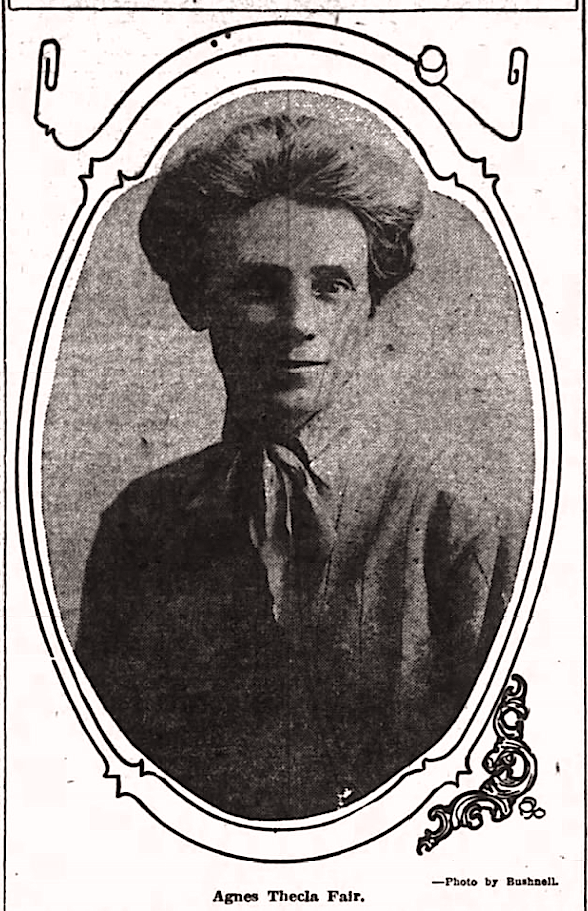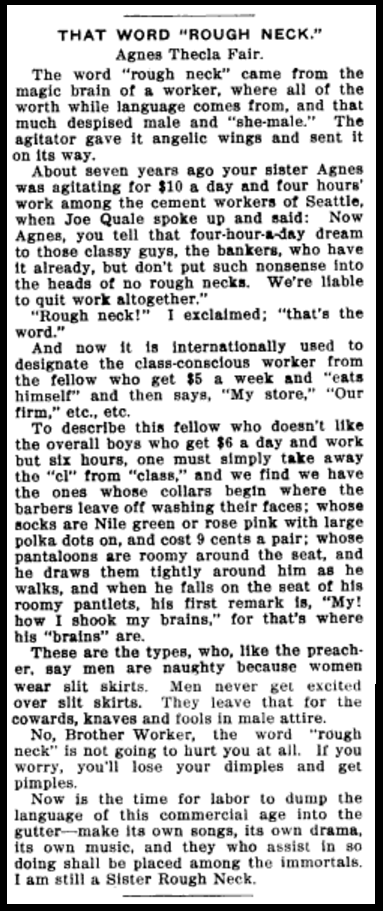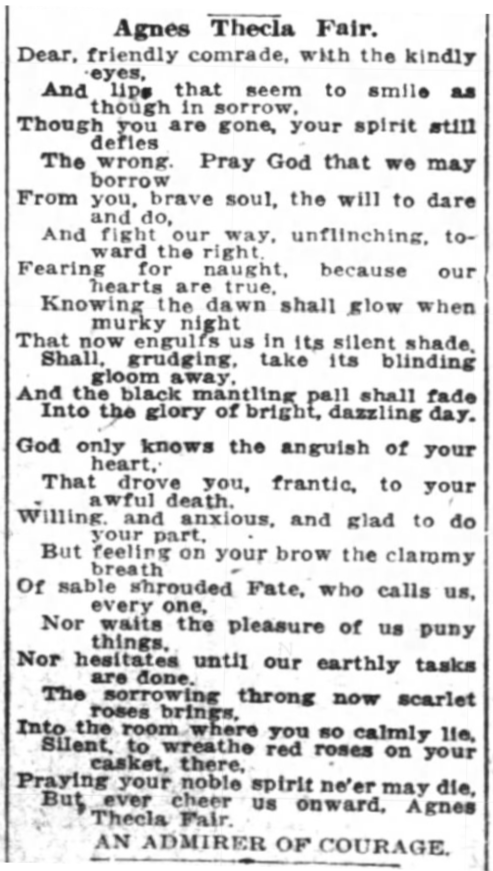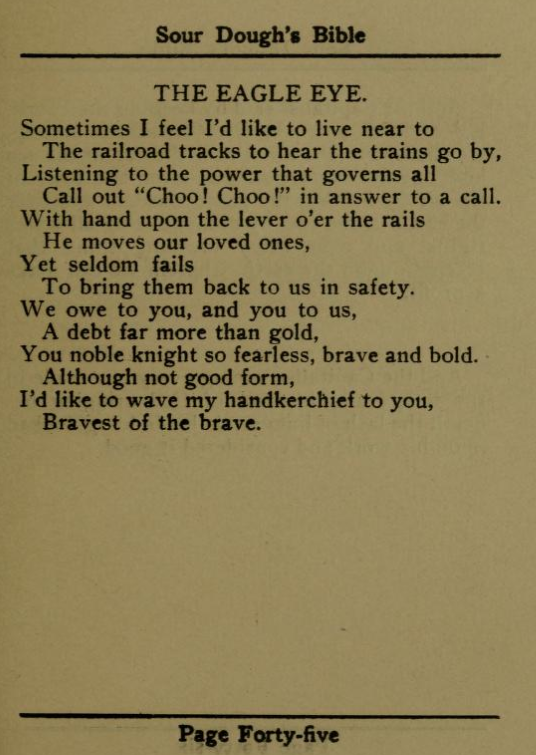I have a sharp tongue and a hat pin,
and know how to put any man down and out
who gets foolish.
-Agnes Thecla Fair
Hellraisers Journal, Tuesday February 13, 1917
Portland, Oregon – Agnes Thecla Fair Journeys On

We are saddened to hear of the death of Sister Agnes Thecla Fair who took her own life on January 11th in Portland, Oregon. The Oregon Daily Journal of January 12th reported:
Convinced that failing health made it impossible for her to continue her work in behalf of the downtrodden in the ranks of labor, Agnes Thesla [Thecla] Fair, noted street lecturer and writer on sociological subjects, yesterday afternoon ended it all by throwing herself in front of an Oregon City electric car on Spokane avenue in Sellwood [a neighborhood of Portland]. She was 37 years of age…
A Tribute from the Appeal to Reason of February 10, 1917:
Agnes Thecla Fair
[“Sister Agnes”-as she was called by thousands-is dead. All through the west, Agnes Thecla Fair’s name is known to the workers in almost every mining and lumber camp. Wherever union men needed help-Agnes was there. Wherever the Socialist had a particular difficult job-Agnes was there. Wherever the victims of the system endured especially trying hardships-Agnes was there with a helping hand. She was a rare character-a real woman hobo. She never hesitated to ride the rods. She went to hundreds of cities via the boxcar route. On such trips she wore overalls. The following appreciation of “The Good Angel of Labor” appeared in the Oregon Journal of Portland, on January 14. Agnes was killed under a train:]
—–
BY ALFRED D. CRIDGE.
Agnes Fair has gone again, this time never to return. She was a frail and earnest little woman, whose experiences had been many and varied for her thirty-seven years of life. She never spoke of her early life or parentage to me, but in a way we were friends.
Agnes was the friend of every man who was down and out. That we were not better friends is because I never was in a position to need her help.
Agnes was first heard of by me as being active in the free speech fight in Spokane some years ago.
She was known before that in Seattle and in the Yukon territory and Alaska as the advocate, nurse and provider for the under dog.
Agnes never sought help for herself. She always sought help for others. She would sell the clothes she had on to help the down and outs. I have known her literally to do so.
I asked her one time if she was not afraid of men taking advantage of her and insulting her. Agnes laughed and shook her head.
[She replied:]
None of the workingmen ever do, some of the silk stocking chaps do once in a while. But I have a sharp tongue and a hat pin, and know how to put any man down and out who gets foolish.
No word of personal reproach ever was uttered against her character.
What her past was as to her personal affairs I do not know. She married years ago and tasted bitter dregs in the wine of life. There may be those among whom she labored, who needed her assistance and her ministrations, who knew Agnes far better than I did. If ever there is a headstone over her grave all I could write upon it other than her name would be “A constant friend of the down and outs.”
At Sedalia, Mo., in 1911, the editor of a labor paper was in distress. He went to a hospital and left the paper without anything but debts, to run as best it could. Agnes flitted in and made it the strangest, warmest, liveliest paper that had ever been run in Sedalia. When the editor returned he found the debts gone, the paper prosperous. Agnes flitted.
In Spokane she established a down and out restaurant and with capable mechanical adeptness attached a gas stove she had “rustled” to a main with no meter between, and for months she was steward, chief cook and clerk of that strange institution. When taxed with her disregard for the sacred property rights of the gas company she laughed at the threats of arrest. Ascertaining that no jury in Spokane would convict her, no prosecution was made.
During a hard winter in Nevada Agnes went down there to look after the poor workers dying with pneumonia. When the laggard charities came in with organizations and system Agnes left. She would flit in and out of any section where the down and outs were in need, or in suffering.
One time she flitted in to announce that she was on her way to Colorado. Months after she flitted back to say that she had been running an “underground” hospital and laughed gaily as she told of how the Pinkertons and the deputies never found the place.
I asked her how she secured supplies and medical attention for her charges. “We ‘glommed’ them,” she replied. With her “glommed” meant secured without regard to niceties of possession.
[She explained:]
The boys got them. Some of them came from the hospital supplies of the imported thugs and deputies and militia. I asked no questions. They were “glommed.”
In Los Angeles one winter she found a number of the “Side Door Pullman” tourists suffering from exposure, hardships, hunger, perhaps wounds and injuries. She established a rude hospital and interested a number of people in her activities until things got going, when she flitted to where there were “lots of sick babies and hungry women to look after,” without telling me the locality.
In Portland during the two winters when the down and outs were congregated by thousands Agnes flitted in and helped here and there as occasion seemed to offer opportunities. Once she went out in the country and rolled in donations from the farmers. Another time she ran a sort of free restaurant in the North end for the indefinite class she referred to as “the boys who are in need of things.”
Some classed her as an I. W. W., and others as a Socialist, while the union labor people in trouble and distress knew her as a working woman. Agnes did work occasionally, and she spoke from soap boxes about solidarity and one big union and the coming revolution, and such subjects.
Her philosophy was a mixture of gleanings from the radical writers on economic and labor subjects, but under it all, or rather over it all, was the desire to help the weak, the suffering, the wounded, the sick among those who were far outside the pale of ordinary charity.
[She broke out one day to me:]
Prisons are traps for foolish men. I try to put the boys who get out wise to the game. They need help when they are hungry and sick. Anybody can help them when they are in the traps, or not in trouble.
Agnes was in San Francisco for several months previous to her last visit to Portland. She came suffering and thin.
[She said:]
I worked too hard in Frisco. There was so much to do. A lot of those labor leaders are awful crooks! I had to come away. I had no more strength. I am going to take a long rest. I have friends.
Her mind wavered. She sought death to end it, and Thursday, January 11, she jumped in front of an oncoming electric train.
[Article inset is from Railway Carmen’s Journal of April 1914.]
———-
Poem for Agnes Thecla Fair
From Oregon Daily Journal of January 25, 1917:
———-
Poem by Agnes Thecla Fair
From the Sour Dough’s Bible:
SOURCES
The Oregon Daily Journal
(Portland, Oregon)
-Jan 12, 1917
https://www.newspapers.com/image/78475190/
Appeal to Reason
(Girard, Kansas)
-Feb 10, 1917
https://www.newspapers.com/image/67312524
IMAGES
Agnes Thecla Fair, OR Dly Jr, Dec 17, 1916
https://www.newspapers.com/image/78321102/
Railway Carmen’s Journal, Volume 19
(Official Organ of the Brotherhood Railway Carmen of America,
Kansas City, Missouri)
January-August 1914
https://books.google.com/books?id=qOJJAQAAMAAJ
Journal of April 1914
https://books.google.com/books/reader?id=qOJJAQAAMAAJ&printsec=frontcover&output=reader&source=gbs_atb&pg=GBS.PA203
“Rough Neck” by Agnes Thecla Fair, Railway Carmen
https://books.google.com/books/reader?id=qOJJAQAAMAAJ&printsec=frontcover&output=reader&source=gbs_atb&pg=GBS.PA223
Agnes Thecla Fair, RIP Poem, OR Dly Jr, Jan 25, 1917
https://www.newspapers.com/image/78480930/
Sour Dough’s Bible
-by Agnes Thecla Fair
Seattle, 1910
https://archive.org/stream/sourdoughsbible00fair#page/2/mode/2up
Agnes Thecla Fair, Sour Doughs Bible, Eagle Eye, pubd 1910
https://archive.org/stream/sourdoughsbible00fair#page/44/mode/2up
See also:
Fellow Workers and Friends: I.W.W. Free Speech Fights as Told by Participants
by Philip S Foner
Greenwood Press, Jan 1, 1981
Chapter 2: “Free-Speech Fight in Spokane, Washington, 1909-1910”
-page 59: “Miss Fair’s Letter” by ATF for Seattle Workingman’s Paper of November 20, 1909, regarding her experience in jail.
https://books.google.com/books?id=y4yxAAAAIAAJ
Wanted: Men to Fill the Jails of Spokane: Fighting for Free Speech with the Hobo Agitators of the I.W.W.
-by John Duda
Charles H. Kerr Publishing Company, 2009
https://books.google.com/books?id=Kl57PgAACAAJ




